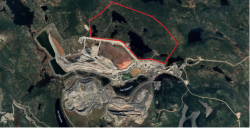(Sept-Îles, Québec, Montréal) Without questioning the importance of the Bloom Lake mine for Fermont city and the Innu communities, eleven local and national organizations as well as three persons from Mani-Utenam and Moisie are calling on federal Environment Minister Steven Guilbeault not to authorize the destruction of lakes to store tailings and waste rock in Fermont, as proposed by Quebec Iron Ore (QIO). Instead, the organizations are calling on the federal government to demand an alternative solution that minimizes the environmental footprint by sparing threatened lakes. They also ask that the federal government’s decision be suspended until a crucial access to information request is processed. This request comes on the eve of the opening of Environment and Climate Change Canada (ECCC) public consultations of the federal assessment on alternative solutions and on a fish habitat compensation plan for the Bloom Lake mine expansion project on February 21 and 23 in Fermont and Sept-Îles, respectively. Remote participation will be offered for Sept-Îles’s consultation.
The organizations, together with Laura Fontaine, Marc Fafard and Danielle Descent, denounce that the consultation will be centred on the compensation plan for the potential loss of fish habitat, while the Commission of Inquiry of the Bureau d’audiences publiques sur l’environnement (BAPE) estimated two years ago that QIO could and should develop an alternative solution preventing the destruction of the lakes in the first place.
The organizations call on ECCC not to give in to the proponent’s economic argument for not backfilling its pit. Any mining project should return its mine waste to the pit in accordance with the principle set out in the Mining Act in section 232.3.
The Ministry of Natural Resources and Forestry (MRNF) has issued a notice stating that the proponent does not have to establish a long-term mining plan in which the profitability of the mineral potential located under the pit would be demonstrated. This notice strongly encouraged the Ministry of Environment and Climate Change to authorize the destruction of the lakes against the advice of the BAPE. However, the MRNF refuses to disclose the justifications on which this notice is based, despite an access to information request sent on November 25, 2022, by Fondation Rivières. However, this information is critical for ECCC and the consulted population to be able to comment on the merits of the proponent’s proposed project and even on its compensation plans – hence, the request to suspend ECCC’s decision while this information is received.
In support of the organizations’ request, the following should be noted:
- The Quebec government’s decision to sacrifice the lakes was made against the advice of the BAPE – In its report, “the Commission of Inquiry is of the opinion that the initiator has not demonstrated that the solutions chosen for the management of mine discharges are those that minimize impacts on wetlands and water [...]. Therefore, the panel recommends that the project not be approved as presented.”1
- No social acceptability for destruction of lakes and natural environments to store mine waste – A recent Léger poll indicates that nearly nine in 10 people in Quebec (89%) say they are in favour of “prohibiting the discharge of mine waste into any lake, river or sensitive ecological environment.”
- Thousands of people are calling on Queébec to reverse its decision and adopt a regulation to prohibit the destruction of lakes by dumping mine waste – To date, 4212 people have signed a petition calling on the Government of Quebec to revoke the authorization granted to QIO to destroy eight lakes to dump its mine waste and to adopt a regulation clearly prohibiting this practice. The petition is an initiative of Eau Secours and the Coalition Québec Meilleure Mine and remains open to signatures.
Background:
- The Bloom Lake iron mine is currently owned by Quebec Iron Ore, a subsidiary of the Australian multinational Champion Iron. It is a gigantic open-pit iron mine located on the Nitassinan in the administrative region of North Shore near Fermont.
- When the project was launched, in 2008, it was presented as a relatively small one. Through orders in council and broken promises that there would be no additional expansions, past and present proponents have developed a mega-mine to extract 16,000,000 tons of iron ore per year without a global assessment of the project’s impacts.
- This growth, without proper planning and consultation, has allowed the proponent to generate hundreds of tons of mine waste. Now, they are treating this waste problem by asking to sacrifice eight lakes for storage.
- Analyses conducted as part of the BAPE showed that the mineral potential sought to be preserved by the proponent was not quantified in a formal technical report. These potential reserves would also come from relatively low-grade deposits compared to the main deposit, and their profitability would be based on conservative economic forecasts.
1Free translation. « La commission d’enquête est d’avis que l’initiateur n’a pas fait la démonstration que les solutions retenues pour la gestion des rejets miniers sont celles qui minimisent les impacts sur les milieux humides et hydriques [...]. En conséquence, la commission recommande que le projet ne soit pas autorisé tel que présenté. »
-30-
For more information:
Marc Fafard, resident of Moisie and spokesperson of Sept-Îles sans uranium, 418-961-3517
Rébecca Pétrin, Eau Secours, 514-246-9075
André Bélanger, Fondation Rivières, 514-272-2666, extension 301
Rodrigue Turgeon, Coalition Québec meilleure mine and MiningWatch Canada, 819-444-9226
Signatory organizations (in alphabetical order):
- Action boréale
- Centre de recherche en éducation et formation relatives à l’environnement (UQAM)
- Coalition Québec meilleure mine
- Danielle Descent, Mani-utenam
- Eau Secours
- Fondation Rivières
- Laura Fontaine, Innue de Mani-utenam
- Marc Fafard, citoyen de Moisie et porte-parole Sept-Îles sans uranium
- Mères au front
- MiningWatch Canada
- Nature Québec
- Organisme de bassin versant Manicouagan
- Regroupement Vigilance Mines de l’Abitibi et du Témiscamingue (REVIMAT)
- Réseau québécois des groupes écologistes
